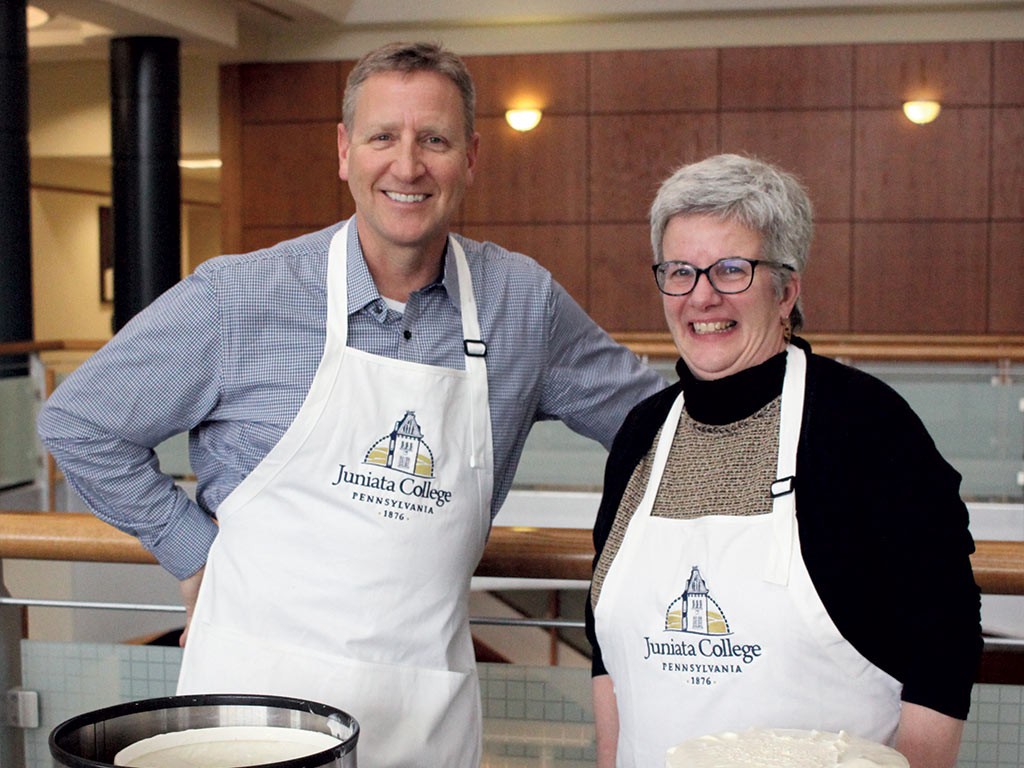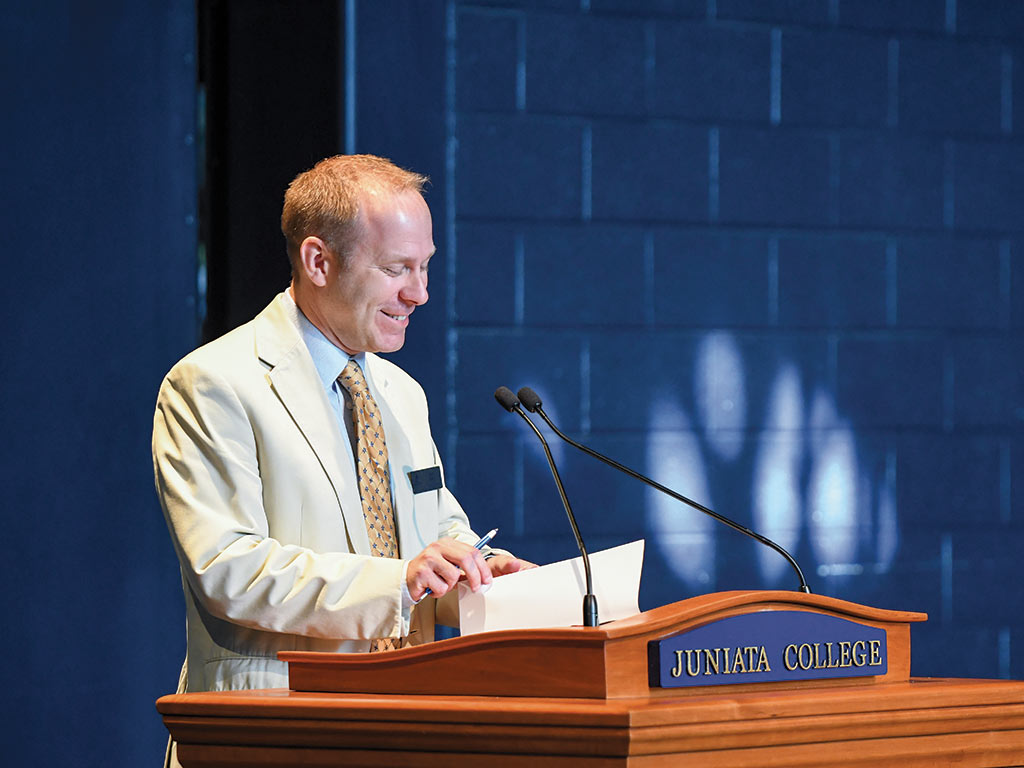Catalyze
The harbinger of crisis in the spring of 2020 was the antithesis of dramatic. There were no Hollywood-esque ripples in a water glass or ominous “dunnnn dun dunnn dun” score. For that matter, there was no approaching dinosaur or great white shark, but danger was imminent nonetheless.
The first international alert, warning of the spread of a novel coronavirus variant was issued on December 30, 2019, but seemed removed from everyday life at the time. In six weeks, COVID-19 began to dominate the news cycle but still seemed relatively remote to those living in central Pennsylvania.
“In late February, we gathered the crisis response team,” said Provost Lauren Bowen, Juniata’s chief academic officer. “At that moment, there needed to be a plan, but I wasn’t feeling a sense of crisis.”
Members of Juniata’s Senior Leadership Team (SLT) met regularly to discuss and evaluate
next steps, making the difficult decision to suspend the choir’s upcoming tour in
Santiago, Chile.
“There was just so much uncertainty. Nobody quite knew what was happening,” President
James Troha said. “So, we were all anxious to learn how deep this was going to go.”
In the first week of March, cases were confirmed in New York, Maryland, and Pennsylvania,
with daily press briefings on the subject becoming the norm. It became apparent this
virus would be nothing like preceding warnings about the hazards of bird flu that
were only to fade away.
“I have this memory of standing in front of the faculty at a meeting in March 2020
and saying, ‘We’re not sure what’s going to happen over the next few weeks, so if
you don’t have plans on how you’re going to use Moodle to teach online, it’s time
to get some plans ready,’” Bowen said. “I said it in a way to communicate it as a
contingency, so be prepared. Then it just happened so quickly.”
“It was March 16 when we knew we had to disperse,” Troha said. “We all thought it would be temporary—an extra week of spring break. No big deal. As things went on, we realized it wasn’t going to be feasible to bring everyone back. What transpired over the next 14 days was the realization that we had to prepare for a longer wait before we would have a normal semester again.”
Bowen had scheduled a trip to New York City to meet with members of Juniata’s Board
of Trustees before the escalation of the pandemic and was in Manhattan the day the
decision to extend spring break was made. Following that meeting, which she attended
through a conference call, she observed an odd phenomenon within notoriously bustling
New York.
“I would leave my hotel room and the streets were just getting quieter and quieter,”
said Bowen. “I went to a Broadway show that Tuesday and Broadway went dark 48 hours
later.”
Spring break came and went. When classes resumed, students and faculty worked remotely.
Work from home became the watchwords for administration and staff. Juniata’s campus,
resplendent in spring blooms, fell eerily silent.
“Everything just stopped,” Vice President for Advancement Jim Watt said. “There was no travel. Students had left. All the projects had stopped.”
For Watt and his team, the disruption threatened the imminent completion of BELIEVE:
The Campaign for Juniata College, a superbly performing seven-year philanthropic campaign
in its final three months. Building projects, some years in the making, also ground
to a halt.
“We were looking profitable,” Watt said. “We were feeling good. The market was still
up. Things were in place and we were looking to have the largest year ever. Then we
had to shift from raising money for big hopes and dreams for the future to maintaining
and surviving. We were asking ourselves how students, our employees, and their families
will survive in this state.”
In a moment when all that seemed certain was uncertainty, Juniata’s community did
what it does best—come together and push forward. Faculty members found new ways of
engaging their students in an unfamiliar medium. Students supported one another through
social and digital media. Administration and staff continued the vital work necessary
to ensure operations continued smoothly, even while working from their couches, dining
room tables, and home offices.
Juniatians discovered their sense of community was not defined by a geographical location. The bonds of blue and gold spanned the globe.

Synthesize
The plan to return to in-person instruction for the fall 2020 semester provided a beacon for the entire Juniata community amid a strange summer marked by separation and uncertainty.
These preparations for an in-person fall semester began prior to the end of the spring semester, with College leadership constantly monitoring ever-changing government mandates and guidelines.
“The mission of providing an individualized education remained paramount. We wanted
to emphasize that we are residential, that we could mitigate risk and keep the community
safe,” said Bowen. “Yet, we understood that for some students and faculty, the risk
was going to be too great. We had to strike a balance, being flexible and adaptable,
while retaining our core identity.”
A hybrid-flexible model of course delivery, HyFlex, that combined online and face-to-face
instruction was implemented. HyFlex provided the ability to respond flexibly to public
health challenges without sacrificing academic quality.
“Our commitment to experiential education is strong, and we tailored those opportunities to meet the students’ needs,” said Bowen. “We figured out how students could conduct research, even if they couldn’t be physically present.”
Enthusiasm for the return to campus was not limited to the Juniata community. Local businesses and residents eagerly anticipated seeing students in town once again.
“One of my favorite experiences happened the week students returned. I was going through the drive-through,” Watt said. “The employee had no idea who I was but saw that I worked at Juniata. He thanked me for the College bringing the students back.”
The COVID Operations Team, known as “COVID-Ops,” included students, faculty, and staff. It researched, designed, and enacted safety protocols on campus.
A precisely orchestrated return-to-campus plan was devised, with drive-through testing provided before students moved into the dorms.
“It was pretty remarkable,” Troha said “A lot of schools didn’t even attempt to come
back in the fall. We were residential, it was a little bit different and spread apart,
but the most important thing we could do was to lean into the testing to make sure
we were going to be protected. Our protocols served our students, staff, and faculty
so we could have a safe, successful year.”
Safeguards were built into the fall schedule. Special events were organized to boost
morale and Mountain Day—albeit in a modified form—was a high point.
“I remember thinking, ‘Okay, let’s get to the finish line.’ Just being able to have a semester during the pandemic was a victory,” Troha said. “As the spring 2021 semester started, the vaccine rollout began, so we continued to look at the levels of protection we could provide our organization against COVID.”
The crowning achievement of the 2020/2021 academic year was hosting an in-person commencement for the class of 2020 and the class of 2021. It was a day everyone at Juniata had longed for since the cancellation of an in-person commencement ceremony in 2020.
Energize
The multi-faceted challenges of the pandemic evidenced the tenacity of the Juniata spirit, carrying the College community through painful experiences to deliver a future filled with promise.
“It’s been a catalyst for us to be much more decisive. When the environment required a greater sense of urgency of leadership, we had to be out in front of a lot of things,” Troha said. “Even though we were reacting to what was happening with the pandemic, we had to be much more aggressive in making decisions.”
Troha described Juniata as one of a handful of schools that made difficult, but strategic, actions early in the pandemic to ensure continuity of operations even when the pandemic lasted longer than anyone could have expected.
There were also lessons in resilience to be learned as long-term plans for the BELIEVE: The Campaign for Juniata and Statton Learning Commons project were reconfigured.
“The campaign was supposed to go a certain way. The Learning Commons was supposed to go a certain way. There was no one to blame, it was just done,” said Watt. “It made me realize that the people you have on your team are more important than the direction you need to go. In the same aspect, you need to have that guiding principle, an ultimate purpose. It was about the mission.”
Disruption became an impetus for innovation. BELIEVE: The Campaign for Juniata will go down in history not because of the pandemic, but because of the remarkable way in which the Juniata community rallied. Out of the pandemic, the Mountain Day Emergency Assistance Fund was created to aid students experiencing hardship. Ground has been broken for the Statton Learning Commons, and the construction phase has begun.
“In the early weeks and months, we led with some boldness in terms of making important decisions — not just on how to deliver the curriculum, but how to support students,” Bowen said. “We had to move quickly and with humanity. All of our decisions have been made with an eye toward meeting people where they are in order to help them so they can get where they want to go, undergirded by a desire to remain decent, kind, and compassionate.”
Within the sphere of academics and operations, the video conferencing app Zoom has become a part of daily life on campus and has added new levels of flexibility and accessibility.
“The utilization of online learning, both in a domestic and global format, helps us understand students who learn differently,” said Bowen. “It has propelled forward what was a broad commitment to inclusion and made it more concrete.”
Experiences gained while steering Juniata through one of the greatest national and global crises in memory pave the way for even further advancement of the institutional mission.
“You’ve got to take the flag and move it forward,” said Troha. “We’ve survived it, we’ve maybe even thrived. It’s a testament to our collective decisive actions and the commitment of our community.”





